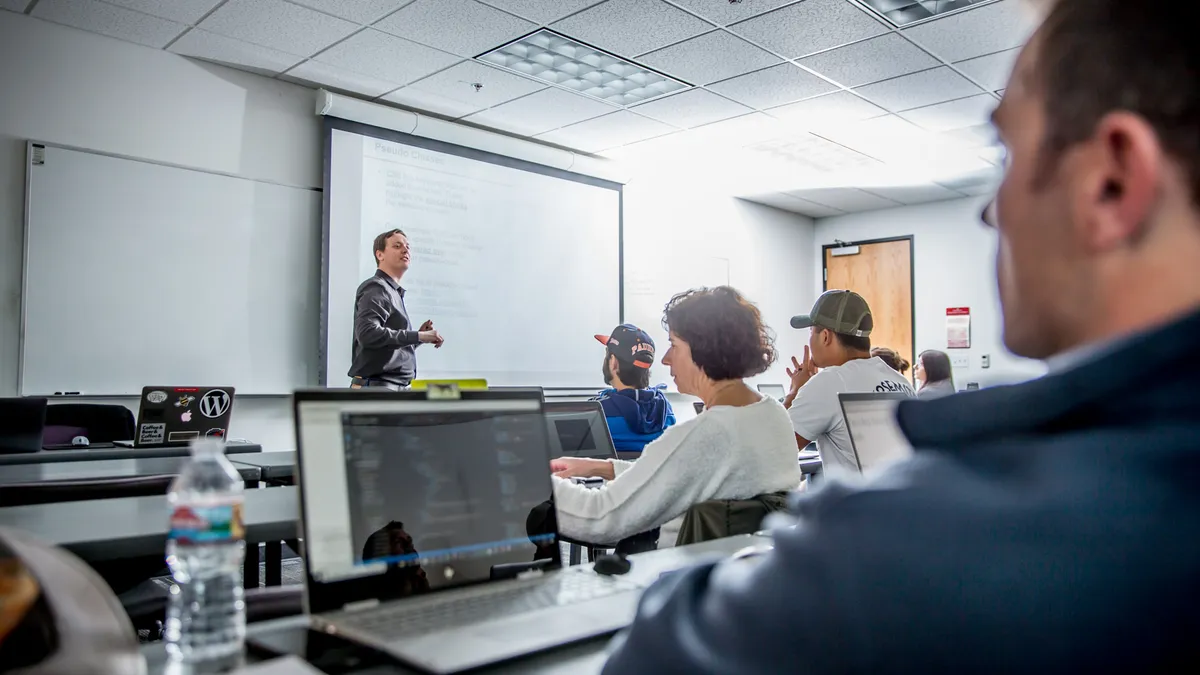Boot camp provider Trilogy Education Services was a big get for online program manager (OPM) 2U, which last month announced plans to pick up the four-year-old company for $750 million. And the move is symbolic of a bigger trend among OPMs to fill out their product portfolios with a broader range of offerings.
Boot camps, which provide intensive skills-based training in technical areas, are expected to be of interest. For instance, Zovio, formerly Bridgepoint Education, acquired boot camp company Fullstack Academy earlier this year. Such deals comes as the boot camp market's growth accelerates and the federal government considers opening up federal aid to short-term programs.
For 2U, the addition of Trilogy expands options for its higher education and corporate partners, particularly in service of the idea that such organizations should provide "lifelong learning" for students and workers. 2U calls it the "career curriculum continuum," which runs the gamut from MOOCs to graduate degrees. It also includes boot camps, both as a standalone product as well as a form of education that can be integrated into other programs.
In turn, the deal gives Trilogy the opportunity to expand its traditionally in-person programs online, and it gives them access to new partners through 2U and the opportunity to bring skills training to more types of educational offerings. The kind of student a company like Trilogy serves — averaging 31 years old — reflects colleges' push to reach students beyond the traditional pool of 18-to-24-year-olds.
To learn more about Trilogy's plans with 2U and how OPMs are bringing skills training to colleges and companies, we spoke with its founder and CEO Dan Sommer.
Editor's note: This interview has been edited and condensed.
EDUCATION DIVE: You've said before that you weren't planning to sell but rather considering an initial public offering. What does this acquisition mean for Trilogy and its next phase of growth?
DAN SOMMER: That is being shaped, but if you were to ask me before this acquisition, I'd say we're continuing to expand into new programmatic areas both on the ground and online. 2U's capabilities will further accelerate our efforts online, in addition to residential and hybrid. Growth areas of location, new programs, and international and enterprise expansion continue, but now with 2U we have greater integration across the university.
As more OPMs add boot camps, how do you view changes in the approach to skills-based education?
SOMMER: Employers want people that have certain technical skills, like the ability to understand and analyze data or to do basic programming. How do we enable universities to have the right offering at the right time to make people more competitive? If that's embedding a boot camp into a degree, great. If that's a standalone non-credit boot camp, great. If that's a short course, fantastic. We have to weave that solution together for students so it can evolve with them throughout their careers.
These aren't just points on a continuum, though — it seems like there's some interest in overlapping skills training and degree programs, such as 2U and Trilogy's work with the University of North Carolina at Chapel Hill's Kenan-Flagler Business School to offer programming boot camp classes for credit toward an MBA.
SOMMER: Absolutely. The bundling concept is really interesting because great degrees set context; they've got the right assessment framework and the knowledge created by universities to teach information students need. But if you could put a dose of technical skill into that degree, it's a much more powerful platform for students.
What are you as the skills-training provider doing differently when you're integrating training into a larger program such as an MBA degree rather than as a standalone entity?
SOMMER: We're integrating it within the context of broader learning outcomes, so the assignments a student might take on are going to fit within the framework of that degree. MBAs, for example, constantly have to try to make sense of data. So with the programming course (at Kenan-Flagler), instead of them going to a data team for a basic analysis of the market opportunity for X, they're learning how to use some of those tools, identify the data sources, and extract and visualize data to tell the story themselves. It cuts a step out of their process and lets them be more hands-on.
Do you view the boot camps integrated into curriculum as a funnel to your other more in-depth programs?
SOMMER: It's a funnel to employers. I think we're going to have MBA students at employers around the world who are going to want to offer upskilling and reskilling programs to their employees. We want to embed as much of this great content as we can because ultimately that's going to give us greater opportunity to serve more students.
You've mentioned opportunity on the undergraduate side. How will that work, or is it happening already?
SOMMER: We have undergraduates in many of our university programs now. We know there's demand. Similar to the MBA student, if you could just put a dose of this type of skill on top of your traditional degree, you're more competitive in the workforce. We're thinking about all types of bridge programs — for example, over the summer, graduating a student into a boot camp and then into an employer. We're looking at all the ways we can do that.
Trilogy's programs have historically been campus-based while 2U is very much online. What are some of the challenges of making that shift for boot camps, which tend to be thought of as intensive and in-person
SOMMER: This notion of online versus offline is blending into more of a hybrid. At 2U there are opportunities for students to meet up live, for example, through their partnership with WeWork. In our programs, students are in classrooms, but they're also doing work online. We also have physical and online events where we support students from a career services perspective. Some students feel very comfortable going into a classroom to learn skills or so they can speak with an instructor physically. Some students prefer the flexibility of online. We want to have more solutions to meet more needs across student populations.
What does that immersive format look like in a hybrid space?
SOMMER: As an example, we have a partnership with Salesforce.com to help their sales engineers be able to talk to their customers about tech. We deployed the solution in a kind of synchronous online environment. The students are employees of a large corporation and at work they sit in the same area, but they are learning online with an instructor. So they can work together either online or physically, if they decide to stay at the office late one evening to learn their material.
What does that look like on the university side?
SOMMER: The program is offered through Columbia University. Their faculty reviews and approves the curriculum we've developed with Salesforce. They also issue a certificate of completion based on the student's ability to meet the program's criteria. That's a great distinction for a corporation. Even as we go into the corporate realm, there'll be university programs.
There have been calls for these kinds of relationships to be more clearly disclosed. Whose job is it to make that disclosure? And to what extent does it matter?
SOMMER: I think it matters. Transparency is incredibly important. We work closely with our university partners to review student progression, to make sure programs are on track. They have to approve every element of the program. We're always looking for ways to incorporate our brand into that discussion, but the university is the center.
With every university partnership we have a conversation about brand. The university brand always will have the prominence, no question. But maybe on the landing page when we talk about the program, there's a more prominent call-out box that has the university brand and Trilogy logo and explains what Trilogy is and its role. Some universities would like that box to be a little larger and some a little smaller. We want to make sure students are aware Trilogy has collaborated with the university offering the program.
You've mentioned adding financial technology and digital marketing boot camps. What other opportunities do you see for subject matter outside of the traditional tech areas?
SOMMER: Not to say this is on our road map, but think about something like creative writing. One complaint I hear the most is that students come out of colleges without basic writing skills. For any skill you can teach in an immersive format, where there's hands-on collaboration, rigorous tools and pedagogy, there's an opportunity. Now, they're much more oriented on industry (demand), but there's something about the immersive boot camp format that could be applied to many disciplines.





















